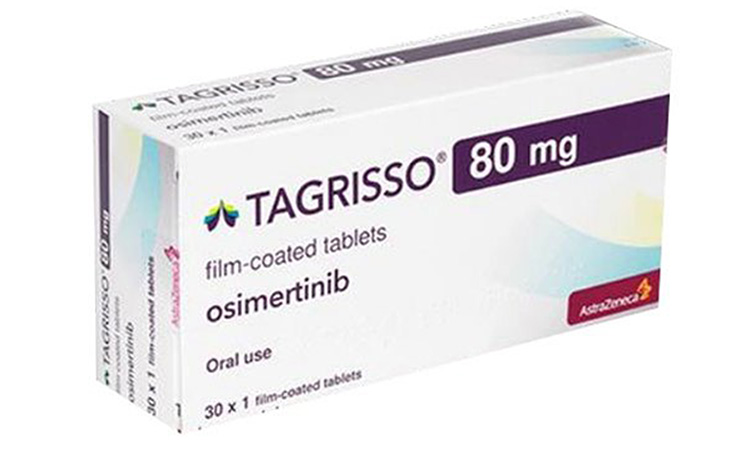Tagrisso (osimertinib) vs Krazati (adagrasib)
Tagrisso (osimertinib) vs Krazati (adagrasib)
Tagrisso (osimertinib) and Krazati (adagrasib) are both targeted therapies for non-small cell lung cancer (NSCLC) with specific genetic mutations, but they differ in their molecular targets and usage. Tagrisso is a third-generation EGFR tyrosine kinase inhibitor designed to treat NSCLC patients with EGFR mutations, particularly T790M, and is often used after resistance to earlier-generation EGFR inhibitors develops. Krazati, on the other hand, is a KRAS G12C inhibitor indicated for the treatment of NSCLC with the KRAS G12C mutation, a subset of patients for whom targeted therapies have only recently become available. For a patient deciding which medicine is right for them, it's crucial to undergo genetic testing to determine the presence of specific mutations in their cancer cells, as this will guide the choice between these two medications.
Difference between Tagrisso and Krazati
| Metric | Tagrisso (osimertinib) | Krazati (adagrasib) |
|---|---|---|
| Generic name | Osimertinib | Adagrasib |
| Indications | Non-small cell lung cancer (NSCLC) with specific EGFR mutations | Non-small cell lung cancer (NSCLC) with KRAS G12C mutation |
| Mechanism of action | EGFR tyrosine kinase inhibitor | KRAS G12C inhibitor |
| Brand names | Tagrisso | Krazati |
| Administrative route | Oral | Oral |
| Side effects | Diarrhea, rash, dry skin, nail toxicity, stomatitis, etc. | Diarrhea, nausea, vomiting, fatigue, increased liver enzymes, etc. |
| Contraindications | Hypersensitivity to osimertinib or any excipients | Hypersensitivity to adagrasib or any excipients |
| Drug class | Tyrosine kinase inhibitor | KRAS inhibitor |
| Manufacturer | AstraZeneca | Mirati Therapeutics |
Efficacy
Efficacy of Tagrisso (Osimertinib) in Lung Cancer
Tagrisso (osimertinib) is a third-generation, irreversible epidermal growth factor receptor tyrosine kinase inhibitor (EGFR TKI) that has shown significant efficacy in the treatment of non-small cell lung cancer (NSCLC) with specific EGFR mutations. Clinical trials have demonstrated that osimertinib is particularly effective in patients with NSCLC harboring T790M mutations, which are a common mechanism of resistance to earlier-generation EGFR TKIs. In the AURA3 study, osimertinib significantly improved progression-free survival (PFS) compared to platinum-based chemotherapy in patients with T790M-positive advanced NSCLC who had disease progression after first-line EGFR TKI therapy.
Moreover, the FLAURA trial further established osimertinib as a first-line treatment option for patients with EGFR mutation-positive NSCLC. In this study, osimertinib not only improved PFS when compared with first-generation EGFR TKIs (gefitinib or erlotinib) but also showed a survival benefit, making it a preferred option for the initial treatment of EGFR-mutated NSCLC. The efficacy of osimertinib in improving overall survival highlights its role as a significant advancement in the management of this specific type of lung cancer.
Efficacy of Krazati (Adagrasib) in Lung Cancer
Krazati (adagrasib) is a newer entrant in the field of targeted therapies for lung cancer, specifically designed to inhibit the KRAS G12C mutation, which is present in a subset of NSCLC patients. KRAS mutations have long been considered "undruggable," but the development of adagrasib has provided a new avenue for treatment. While adagrasib is still in the investigational phase, early clinical trials have shown promising results in terms of efficacy. The CodeBreaK 100 clinical trial, which is evaluating adagrasib in patients with KRAS G12C-mutated NSCLC, has reported encouraging response rates and disease control rates in patients who have previously been treated with chemotherapy and/or other targeted therapies.
Adagrasib's mechanism of action involves covalently binding to the mutated KRAS G12C protein, locking it in an inactive state, and thereby inhibiting tumor cell proliferation. Preliminary data suggest that adagrasib has a favorable safety profile and can lead to deep and durable responses in patients with advanced NSCLC harboring the KRAS G12C mutation. As research continues, adagrasib may become an important targeted therapy for this challenging mutation in lung cancer, offering hope to patients with limited treatment options.
Regulatory Agency Approvals
Tagrisso
-
European Medical Agency (EMA), European Union

-
Food and Drug Administration (FDA), USA

-
Health Canada

-
Therapeutic Goods Administration (TGA), Australia

-
Medsafe (NZ)

Krazati
-
Food and Drug Administration (FDA), USA

Access Tagrisso or Krazati today
If Tagrisso or Krazati are not approved or available in your country (e.g. due to supply issues), you can access them via Everyone.org.
How it works

Make an enquiry
Choose the medicine you want to buy, answer a couple of questions, and upload your prescription to speed things up. We’ll get back to you within 24 hours.


Make an enquiry
Choose the medicine you want to buy, answer a couple of questions, and upload your prescription to speed things up. We’ll get back to you within 24 hours.


Breeze through the paperwork
We'll guide you through the required documents for importing unapproved medicine, ensuring you have all the necessary information.


Get a personalized quote
We’ll prepare a quote for you, including medicine costs and any shipping, administrative, or import fees that may apply.


Receive your medicine
Accept the quote and we’ll handle the rest - sourcing and safely delivering your medicine.

Some text on this page has been automatically generated. Speak to your physician before you start a new treatment or medication.
Let's talk
If you have any questions, call us or send us a message through WhatsApp or email:
Contact us




